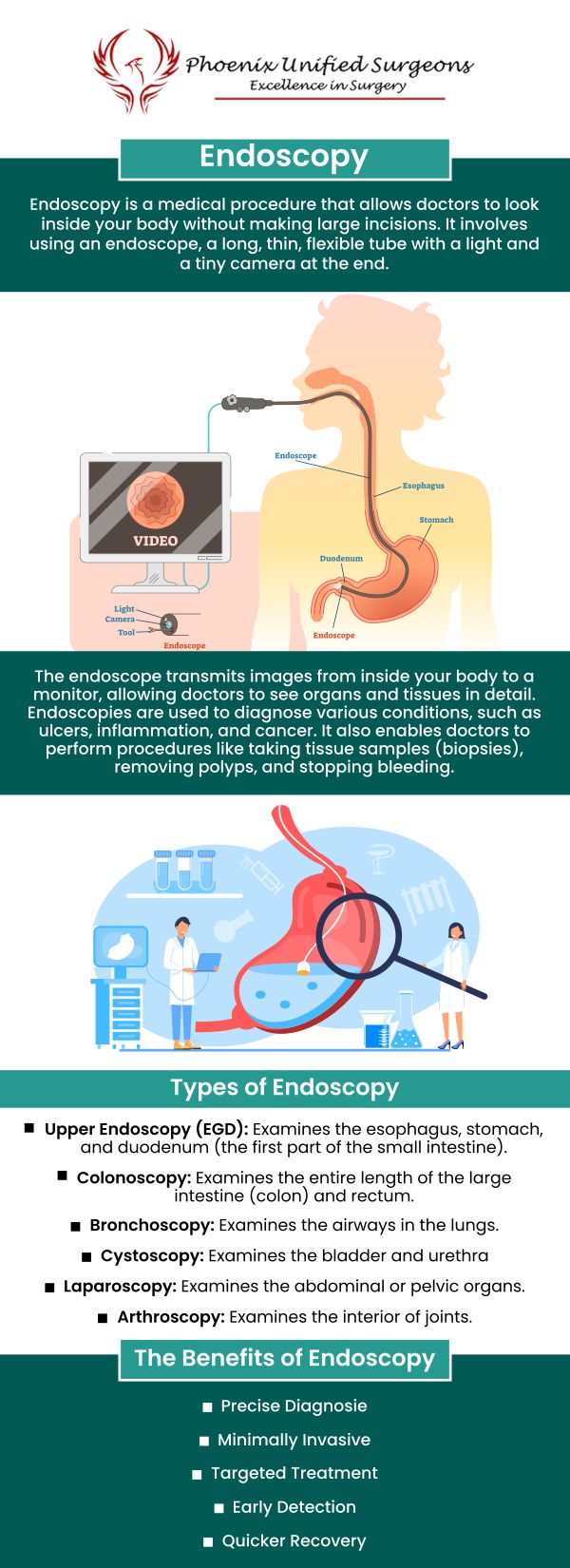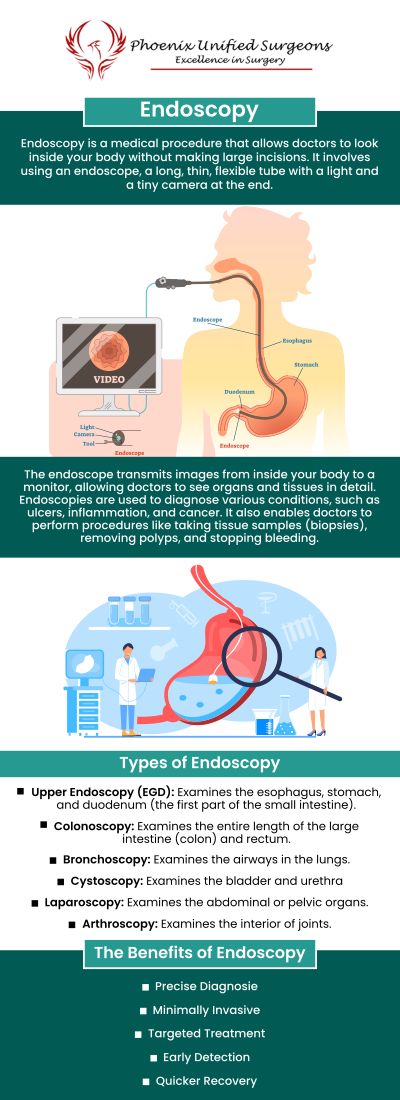Endoscopy Specialist in Phoenix, AZ
Endoscopy is a medical treatment that allows doctors to detect and treat various illnesses by looking into the digestive tract with a flexible tube equipped with a light and camera. It is frequently done as an outpatient procedure, is minimally invasive, and offers important insights into conditions including tumors, inflammation, and ulcers. For precise endoscopic diagnosis and efficient treatment of your digestive health issues, consult our knowledgeable staff at Phoenix Unified Surgeons. Please contact us or book your appointment online. Our office is conveniently located at 20333 N 19th Avenue, Ste 230 Phoenix, AZ 85027.




Table of Contents:
How painful is an endoscopy?
What is an endoscopy used to diagnose?
How long does it take to recover from an endoscopy?
How soon can you eat after an endoscopy?
Phoenix Unified Surgeons prioritizes patient comfort and safety during all our medical procedures, including endoscopies. Endoscopies are highly efficient diagnostic tools, allowing our doctors to examine your digestive tract using a thin, flexible tube equipped with a light and camera.
While the level of discomfort during an endoscopy can vary depending on a few factors, such as individual pain tolerance, the type of endoscopy, and the presence of inflammation or lesions, it’s important to note that this procedure is generally not considered painful.
Our team at Phoenix Unified is experienced in both upper and lower endoscopies. Upper endoscopies, which examine the esophagus, stomach, and duodenum, typically cause less discomfort compared to lower endoscopies that examine the colon and rectum.
Our priority is your comfort. Therefore, before the procedure, we administer a sedative or anesthesia to help you relax and reduce pain perception. A local anesthetic is also used, usually as a spray to the back of your throat or rectum, to numb the area and minimize discomfort as the endoscope is inserted.
During the procedure, air is pumped into the digestive tract to give our doctors a better view, which may cause a feeling of fullness or mild discomfort. Rest assured, this is not typically painful, and if a biopsy is taken during the endoscopy, you generally won’t feel a thing.
Post-procedure, you may experience temporary throat discomfort due to irritation caused by the endoscope. Mild bloating or cramping as the air leaves the digestive tract is also common.
At Phoenix Unified, we ensure that all our patients are as comfortable as possible before, during, and after the procedure. We use various pain management techniques to achieve this. If you have any concerns about discomfort or pain, we encourage you to discuss these with our doctors before your endoscopy. We assure you that endoscopies are generally considered safe.
At Phoenix Unified Surgeons, we understand the importance of an accurate diagnosis for effective treatment. That’s why we utilize advanced diagnostic procedures like endoscopy. This non-surgical, minimally invasive procedure enables our healthcare professionals to visualize the interior of your digestive tract and other bodily cavities, providing more detailed information than conventional imaging tests. Our team of experts is experienced in diagnosing stomach ulcers, stomach or esophagus cancer, and Gastroesophageal reflux disease (GERD).
Additionally, endoscopy is used to identify inflammatory bowel illnesses like Crohn’s disease and ulcerative colitis as well as ailments like celiac disease. We can detect diseases including gastritis and peptic ulcers, as well as determine the reason behind upper gastrointestinal bleeding and establish the existence of hiatal hernias.
Apart from gastrointestinal disorders, endoscopy assists our team in diagnosing pulmonary conditions like asthma and chronic bronchitis through bronchoscopy. In the urinary tract, we use cystoscopy to diagnose infections, bladder stones, and tumors. For reproductive organ issues, our experts utilize hysteroscopy and laparoscopy to visualize the uterus, fallopian tubes, and ovaries, assisting in diagnosing fertility problems, endometriosis, and uterine abnormalities.
Endoscopy at Phoenix Unified is also pivotal in the detection of early cancers in the digestive tract and other organs, enabling early intervention and treatment. During the procedure, your healthcare provider can also obtain tissue samples for further analysis (biopsy) to confirm or rule out a diagnosis.
In summary, as a patient at Phoenix Unified Surgeons, you can be assured of receiving the most advanced diagnostic procedures. Endoscopy is a versatile diagnostic tool that provides valuable information about the underlying condition and guides appropriate treatment options, thereby enabling our doctors to make a more accurate diagnosis, leading to effective treatment plans.
At Phoenix Unified, our healthcare professionals are highly skilled in conducting a range of endoscopies, whether rigid or flexible.
Rigid Endoscopy at Phoenix Unified
Our rigid endoscopy services, such as Esophagogastroduodenoscopy, are carried out by our highly trained team. Post-procedure, patients may experience mild discomfort, hoarseness, or nausea. Our team offers comprehensive advice on how to manage these symptoms, including the importance of not driving or operating machinery for 24 hours due to the sedatives used during the procedure. We may also recommend over-the-counter pain medication or lozenges for any throat irritation.
Flexible Endoscopy at Phoenix Unified
We also offer flexible endoscopies like colonoscopies, performed by our experienced practitioners.
Whether you’re undergoing a rigid or flexible endoscopy at Phoenix Unified, your comfort and well-being are of utmost importance to us. Our healthcare providers will give you a clear understanding of the procedure, recovery, and any necessary aftercare.
Your Recovery at Phoenix Unified
We encourage our patients to take ample rest, avoid strenuous activities for 24 hours, and gradually reintroduce soft, bland foods post-procedure. Hydration is key, particularly after a flexible endoscopy.
We schedule timely follow-up appointments to monitor your recovery. Should you experience severe symptoms like abdominal pain, vomiting, difficulty breathing or swallowing, fever, chills, or blood in your stool or vomit, our team is ready to provide immediate medical attention.
We provide the highest standards of care for our patients, ensuring a smooth and successful recovery from endoscopy procedures.
To ensure a smooth recovery and avoid complications, we provide our patients with specific dietary guidelines to adhere to post-procedure.
Waiting until the effects of the sedation have worn off before reintroducing food is crucial. This waiting period varies from person to person, depending on individual reactions to the sedative. It typically lasts around an hour for some, while those who received conscious sedation during the endoscopy are recommended to wait for at least 2-4 hours. This waiting period allows the sedative to fully wear off and ensures that your gag reflex returns to normal.
We recommend starting with sips of water or clear juices once the sedation has worn off. If you do not feel nauseous or experience any discomfort, you may then gradually introduce soft, easy-to-digest foods such as soup, yogurt, mashed potatoes, rice, or plain pasta into your diet. We advise against heavy, spicy, or fatty foods immediately after the procedure, as well as hot or spicy, hard or crunchy, chewy or gooey, acidic or citrusy foods.
Over the next few days, you can gradually reintroduce your regular diet. Our doctor may provide more specific dietary instructions based on your health or the results of the endoscopy.
Remember, your health and comfort are our utmost priority. Always listen to your body and do not rush the recovery process. If you feel unwell, stop eating and consult the doctor at Phoenix Unified Surgeons immediately. Please contact us or book your appointment online. Our office is conveniently located at 20333 N 19th Avenue, Ste 230 Phoenix, AZ 85027. We serve patients from Phoenix AZ, Sun City AZ, Peoria AZ, Surprise AZ, Glendale AZ, Scottsdale AZ, and surrounding areas.
Check Out Our 5 Star Reviews



Additional Services You May Need
▸ Colon & Rectal Surgery
▸ Gallbladder Surgery
▸ Colonoscopy
▸ Wound Care
▸ Hernia Repair
▸ General Surgery
▸ Robotic and Minimally Invasive Surgery
▸ Appendectomy
▸ Colon Repair/Resection
▸ Lipoma & Cyst Removal
▸ Endoscopy and Colonoscopy
▸ Abdominal Pain
▸ Colon surgery for Diverticulitis
▸ Colon surgery for Colon Cancer
▸ Hemorrhoids
▸ Anal Fistulas
▸ Anal Pain Surgeries
▸ Colostomy Avoidance Surgery
▸ Fecal Incontinence Surgery
▸ Crohn’s Surgery
▸ Ulcerative Colitis Surgery






